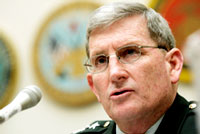JIM.LOBE
Senate report exposes Bush’s deception on Iraq war (FCN, 09-21-2003)

WASHINGTON (IPS/GIN) – With the U.S. intelligence community agreeing that the invasion and occupation of Iraq have made this country less safe from terrorist threats, President George Bush appears now to be facing a growing revolt among top military commanders who say U.S. ground forces are stretched close to the breaking point.
According to a recent Los Angeles Times, the Army’s top officer, General Peter Schoomaker, has called for a nearly 50 percent increase in spending——to nearly $140 billion——in 2008 to cope with the situation in Iraq and maintain minimal readiness for possible emergencies.
To convey his seriousness, Gen. Schoomaker reportedly withheld the Army’s scheduled budget request in August in what the Times called an “unprecedented … protest” against previous rejections by the White House of funding increases.
The news of Gen. Schoomaker’s action, which is almost certain to intensify the growing debate over what to do in Iraq just seven weeks before the Nov. 7 mid-term congressional elections, comes just days after the New York Times reported that the Army is considering activating substantially more National Guard troops or reservists.
Such an action, which would run counter to previous administration pledges to limit overseas deployments for the Guard, would pose serious political risks for the Republicans if it was taken before the elections.
Unlike career soldiers, the Guard consists mainly of “citizen-soldiers” with civilian jobs and deep roots in local communities. When the Pentagon last called up substantial numbers of Guard units for service in Iraq and Afghanistan in late 2003 and 2004, the move elicited a strong backlash in communities across the country.
With the war even less popular now, any major new call-up is likely to trigger renewed protests, particularly in light of the growing sense both among the national security elites and the general population that the administration’s decision to invade Iraq was a major mistake and that the war is unwinnable.
Recent public opinion polls have shown that the public has become increasingly pessimistic about the war’s outcome and its impact on the larger “global war on terror.”
For most of the past year, a majority of respondents in various polls have said they believe the decision to go to war in Iraq was a mistake and that it has made the United States less, rather than more, safe from terrorism.
The fact that a similar conclusion was reportedly reached last April by the 16 agencies that make up the U.S. intelligence community in a rare National Intelligence Estimate (NIE) is likely to add to the public’s pessimism.
Adding to the burden on the Army and the Marines, the resurgence of the Taliban has forced Washington to cancel plans to reduce forces in Afghanistan from 19,000 earlier this year to around 16,000 by this fall.
Instead, Washington currently has more than 20,000 troops deployed there amid signs that more may be needed if NATO fails to provide more troops of its own or if, in light of the retreat of Pakistani forces from neighboring Waziristan, the Taliban mount an even bigger offensive from across the border next spring after the snows melt.
These commitments have taken a huge, unanticipated toll on U.S. land forces, not just in manpower, but in equipment and money as well.
The military has greatly intensified its recruitment efforts, relaxed its age and education requirements for enlistment, and offered unprecedented bonuses and benefits packages –worth thousands of dollars–to enlistees and active-duty soldiers who re-enlist.
It has also increased enlistments by individuals with “’serious criminal misconduct” in their records,” and eased requirements of non-citizens——of which there are currently about 40,000 in the armed services——and made them eligible for citizenship after only one day of active-duty military service.












